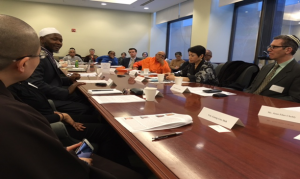Give Me 5 Special Report
The NGO Committee on Sustainable Development-NY (O1-26-2017)
“Interfaith Partnerships for the 2030 Sustainable Development Agenda”
The Give Me 5 Campaign was proud to be in attendance and a co-organizer along with other leading Sponsors including the UN Secretary General’s TOGETHER Campaign of the NGO Committee on Sustainable Development-NY meeting on “Interfaith Partnerships for the 2030 Sustainable Development Agenda” which was on January 26th at the Baha’i International Office directly adjacent to United Nations Headquarters. Co-Chair Margo LaZaro acknowledged the outstanding support and contributions of both Daniel Perell of the Bahai International Community and Juan Elias Chebly, Founder of Give Me 5 and Lead Adviser for the UN Environment Programme.
The meeting brought together a collection of twelve keynote speakers in this discussion, including: UN high-level leadership, faith based leaders, former government ambassadors, leadership of foundations, and a plethora of civil society representatives from a global constituency. The forum allowed for a healthy discourse amongst those in attendance and the speakers on the importance of inter-faith dialogue and partnership with global institutions to achieve SDG practices –“To Leave No One Behind.”
Very relevant for the Give Me 5 Campaign and our mission of SDG financing was the fact raised about the power and investment potential that Faith Based Organizations (FBO’s) possess. A clearer picture of this concept can be seen in the UNFPA Report “Realizing the Faith Dividend: Religion, Gender, Peace, and Security in Agenda 2030.” Dr. Azza Karam, Ph.D, Senior Advisor on Culture and Social Development at the United Nations Population Fund discussed the report in further depth.
Mr. Elliott Harris Assistant Secretary General and Head of the United Nations Environmental Programme (New York Office) spoke on the important role of faith based leaders as strong stewards of the environment, and the crucial networks these leaders posses to vulnerable populations across the biosphere.
Many valuable insights emerged from the meeting, including best practices on how to engage with FBO’s and their communities to ensure religious and gender parity. For a clearer picture of some of these “best practices” see the UNDP guide on how to engage with FBO’s and religious leaders that was published in October 2014. It is the hope of this meeting that such discussions will continue and flourish in the international space.
The true power of faith however, and the insight of faith leaders is that they are directly connected to the deepest beliefs in people. Religions transcend class, politics, and strengthen communities. Religious communities have exceptional networks in the most geographically and economically marginalized regions. The institutions of religion support those who have no other safety-net or recourse. Religious leaders possess a unique degree of legitimacy across a multitude of actors, as they are motivated by spiritual and non-material factors. As was so eloquently positioned by the speakers, “all religions are part of the same body” and sustainability has long been a religious narrative.



